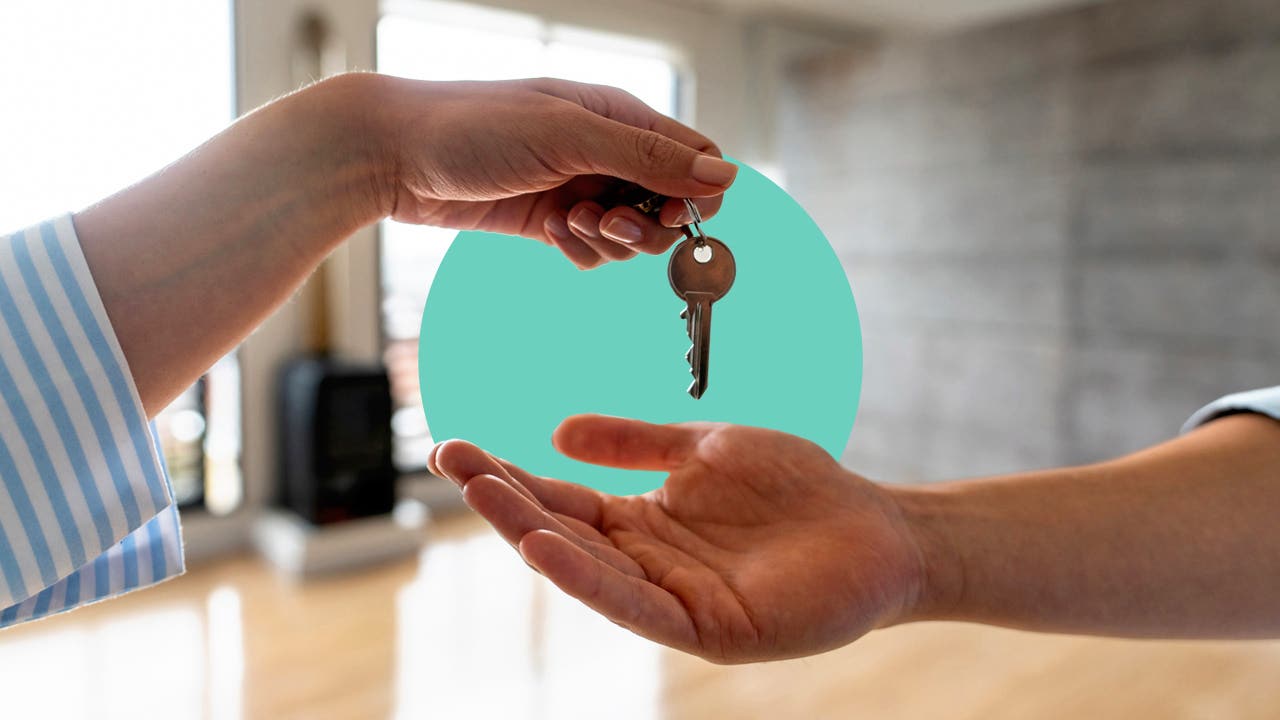Sky-high home prices put homeownership beyond most people’s reach. What’s so wrong with renting?

Key takeaways
- With home prices and mortgage rates currently high, renting is a more affordable option than buying a home.
- Renting also allows more flexibility to move and greater financial freedom, which is helpful for young people just starting their careers.
- However, owning a home offers stability and the potential for long-term wealth creation in a way that renting does not.
Should you try to buy a house now, or wait? If you live in or near one of the country’s top urban centers, playing the waiting game is probably looking much more appealing. It’s cheaper to rent a typical home than to buy in each of the country’s 50 biggest metro areas, according to Bankrate’s Rent vs. Buy Affordability Study. And in some of those places, the difference is massive: In Salt Lake City, for example, owning a home is 89 percent more expensive than renting one.
Between elevated mortgage rates and record-high home prices, home affordability is becoming an insurmountable challenge for some. It’s no wonder many renters, particularly the younger generations, are giving up on the thought of ever buying a place of their own. If you’re thinking about ditching the down payment, too, read on for the pros and cons of long-term renting.
Home prices make buying impossible for many
Prices are through the roof lately: The median sale price of a home in the U.S. reached an all-time high of $419,300 in May 2024, the highest median the National Association of Realtors has ever recorded. And borrowing the money to buy one presents an equally daunting challenge, with mortgage rates hovering around 7 percent for a 30-year loan. Even if you can come up with a 20 percent down payment on a $400,000 home — that’s $80K upfront, not including closing costs — your monthly mortgage payment would be more than $2,000 in principal and interest alone.
For most people thinking about buying a home, the math simply doesn’t add up. But it’s most difficult for young first-time buyers who are already struggling financially. Nearly half (49 percent) of people 23 or older who receive (or have received) financial assistance from their parents or guardians say they’ve had help with housing costs, according to Bankrate’s Financial Independence Survey. Additionally, 17 percent of people who receive/received financial assistance from their parents had help with the purchase of their first home.
Aspiring homebuyers whose parents don’t have such sizable bank accounts face a rough road to homeownership — particularly if you’re also balancing student loan debt as you begin your career. Renting may look a lot more convenient, and less scary, than trying to buy a house.
Home affordability stats
- In nearly half of all U.S. states — 22 states plus Washington, D.C. — you’d need a six-figure salary to afford a median-priced home, according to Bankrate’s Housing and Income Study.
- The median sale price of a home reached an all-time high of $419,300 in May 2024 — the highest median price ever recorded by the National Association of Realtors.
- The median monthly housing payment also hit an all-time high in May, registering $2,894, per a recent Redfin report.
- Fannie Mae’s most recent Home Purchase Sentiment Index shows that 86 percent of consumers think it’s a bad time to buy a home.
- Bankrate’s 2024 Home Affordability Report showed that 78 percent of non-homeowners who’d like to own a home cite affordability-related reasons for why they don’t.
What’s so wrong with renting, then?
Being able to purchase a house might feel like you’ve made it, but younger people are less likely to believe that owning their own place is synonymous with success. While 78 percent of U.S. adults felt that owning a home was a key part of the American Dream, according to Bankrate, that percentage was highest for the older generations: 88 percent for baby boomers (ages 59-78) and 83 percent for Gen Xers (ages 44-59). For millennials (ages 28-43) it drops down to 71 percent, and Gen Z (ages 18-27) was even lower at 68 percent.
Note: Respondents could select more than one response.
Source: Bankrate survey, March 6-8, 2024
It makes sense: Younger generations are less likely to already own a home they can sell to put proceeds toward another purchase, and are often too early in their careers to be making big bucks. Given the circumstances, of course long-term renting seems like the preferable option.
Renting also offers the ability to easily relocate — a big benefit if you’re young and hungry to chase new career opportunities. “Renting offers tremendous flexibility without the hassle of selling and buying a property,” says Mark Hamrick, senior economic analyst at Bankrate. “That’s key if you aren’t ready to settle down or don’t have a firm idea of where you want to be for the long term.”
Hamrick also points out that renting offers the ability to avoid a large upfront cost: “You typically just have to pay a security deposit,” he says. “Since you aren’t tying up funds in a property, you can enjoy more financial freedom.”
Renting offers tremendous flexibility. That’s key if you aren’t ready to settle down or don’t have a firm idea of where you want to be for the long term.— Mark Hamrick, Bankrate Senior Economic Analyst
Renters also avoid a lot of the additional costs that come with owning and maintaining a home, such as repairs, upkeep, homeowners insurance premiums and property taxes. If the air conditioner breaks or a plumbing issue arises in a rental, that’s your landlord’s responsibility, not yours.
However, Hamrick points out, buying a home is a primary path toward wealth creation. “It’s not just for you as the owner,” he says. “One has the opportunity to provide a transfer of wealth to future generations, too.” And outside of accumulating equity in the property, owning also provides the ability to feel like a permanent part of a place. “One of the reasons why owning a home is associated with the American Dream is the sense and stability of being part of a community,” he says.
Pros and cons of long-term renting
Whether you’re thinking about signing a long-term lease or you’re just not sure if you can afford a house right now, here are some advantages and disadvantages to consider.
Pros
- More flexibility: Relocating is much easier for renters, as you can just leave at the end of the lease without having to worry about finding a buyer. In some cases, you may even be able to find a landlord willing to operate on a month-to-month basis that avoids a long-term commitment.
- Lower costs: You don’t need to worry about maintenance, property taxes or HOA fees when you’re renting, and monthly rent is typically cheaper than a mortgage payment.
- Time to save: When you’re paying less in rent, you can take advantage of the saving opportunity: Put away extra cash so that when you’re ready to plant permanent roots, you’ll be able to afford the purchase more easily.
Cons
- No equity: When you own a place, you accumulate home equity as you pay off the mortgage. That benefits you in the long term and helps you grow wealth, especially when you’re ready to sell. Rent payments don’t do that.
- Lack of connection: As Hamrick notes above, it’s much tougher to feel a community spirit with neighbors who constantly come and go as their leases expire.
- Less liquidity: For many homeowners, a large portion of their personal wealth is tied up in their home. That means the money isn’t immediately available if you need it in an emergency — or if you just want to take a nice vacation.
Bottom line
With prices and mortgage rates both high, and housing inventory scarce, planning to renew your lease certainly isn’t the worst decision. In 2024, the housing market continues to look daunting for anyone trying to navigate the complexities of their first home purchase. But even if you put off buying now, don’t automatically put yourself in the forever-renter category.
“Renting has its benefits, but buying a home and staying in it for an extended period of time can offer big advantages,” Hamrick says. “Just be sure to avoid stretching your budget too far, and make sure you have sufficient savings to manage the inevitable costs of homeownership.”
Why we ask for feedback Your feedback helps us improve our content and services. It takes less than a minute to complete.
Your responses are anonymous and will only be used for improving our website.






